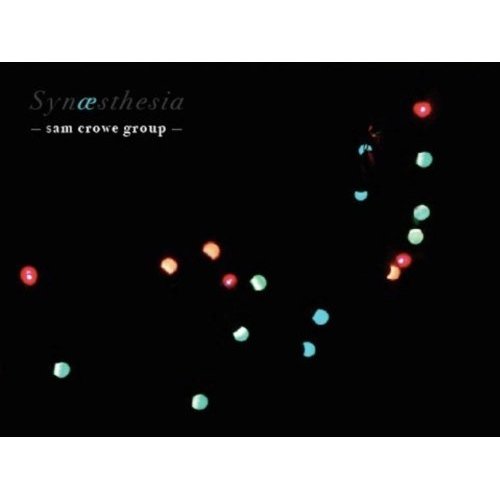
by Ian Mann
May 15, 2010
/ ALBUM
An album that should help to establish Sam Crowe as a playing and composing force to be reckoned with on the UK jazz scene.
Sam Crowe Group
“Synaesthesia”
(F-ire Presents F-IRE CD 31)
The latest release on the F-ire presents imprint is this album from a group led by the young Bristol born pianist and composer Sam Crowe. Crowe is a graduate of Trinity College, London and is now a freelance musician on the capital’s jazz scene. His path to jazz has been circuitous and embraced an early interest in classical music, a flirtation with pro basket ball and an involvement with Bristol’s trip hop and drum and bass scenes. He has also had some success as a film composer contributing to the soundtrack of “Lullaby For Pi” starring Forest Whittaker and Rupert Friend.
For his début album he has assembled a cast of some of London’s finest young jazz musicians. Saxophonist Adam Waldmann and bassist Jasper Hoiby are already familiar as members of the acclaimed Kairos 4tet. Drummer Dave Smith is a leading figure in the increasingly influential Loop Collective and leader of the band Outhouse. The group is completed by guitarist Will Davies, like Crowe a name hitherto unfamiliar to me. However “Synaesthesia” leaves one in no doubt as to the abilities of both and the UK jazz scene will doubtless hear a lot more from these talented young players.
Before studying music full time Crowe commenced but did not complete a course in linguistic studies at University College, London. It may be this experience that accounts for the title of the record. In simple terms “synaethesia” refers to those who sense sounds and smells as colours. Crowe gives a more detailed explanation on the cover and it’s clear from this that he’s an intelligent and sensitive guy, qualities that come across in his group’s lyrical but rigorous music. For all that though it’s not the snappiest of album titles is it? Most potential buyers probably won’t even be able to pronounce it.
That minor misgiving aside “Synaesthesia” (it’s a bugger to type as well) is an excellent record that represents a mature and assured first step in Crowe’s jazz career. The presence of Waldmann in the group invites comparisons with the excellent Kairos 4tet and there are certainly similarities in the approach of both groups. Both are thoughtful and quietly lyrical with strong melodic ideas but the presence of Davies’ guitar gives Crowe’s band an additional instrumental voice that helps to establish a distinctive group identity.
All eight tracks are Crowe originals and the album begins with “Synaesthesia” itself which unfolds slowly and lyrically with important contributions from all members of the group. Saxophonist Waldmann is mainly heard on tenor - he tends to specialise on soprano in his own Kairos 4tet- but he brings the same thoughtful qualities to bear on Crowe’s music. The opener also contains major solos from Crowe himself and from Davies whose serpentine guitar solo is consistently inventive. Smith’s drumming is colourful and quietly forceful whilst Hoiby’s supple but powerful bass playing is an asset to any record.
“Mother Nature’s Middle Age” opens with a beautiful duet between piano and guitar before the addition of Waldmann’s breezy tenor and Smith’s busy, pattering brushed undertow. The excellent Hoiby features as a soloist and displays his usual astonishing dexterity and Crowe also features extensively and with increasing urgency as the piece gains momentum.
Most of Crowe’s pieces are lengthy affairs that allow his themes to develop gradually and many of his compositions embrace changes of mood and pace. “The Global Brain” alternates urgent, percussive passages with moments of greater lyricism. Crowe’s own solo is his most forceful playing to date and the interplay between sax, guitar and piano in the tune’s busiest moments is dazzling. Behind the frontliners Smith and Hoiby keep the pot bubbling with a vibrant, colourful rhythmic display.
“Fall From Grace” is a beautiful ballad opened by Davies’ bell like guitar ( he also solos later) and features warm, feathery saxophone from Waldmann plus Crowe at his most lyrical. Smith’s perfectly judged brushed accompaniment is the icing on the cake. The tune is later reprised as a lovely solo piano piece at the very end of the album.
“Maxman” is pleasantly quirky opening with Crowe’s playfully percussive piano later joined by Waldmann’s jaunty soprano and Davies’s guitar. However in typical Crowe fashion there are more sombre passages too, with Waldmann’s horn taking on a wholly different feel as he probes gently above the shifting rhythms and pulses of Crowe,Smith and Hoiby. Crowe’s own solo is tumbling and exuberant and demonstrates his considerable versatility. He convinces whatever the mood or setting. Davies maintains the celebratory atmosphere as he plays the tune out with an exultant Metheny like solo.
“Phoebe Baby” is a return to ballad territory opened by the composer’s Jarrett like piano. Waldmann’s warm, tender tenor dovetails beautifully first with Davies and then with Crowe who also solos in thoughtful fashion. Smith and Hoiby offer their customarily excellent support.
“Willow The Wisp” features Crowe on electric piano and is the most groove driven piece on the album. Cerebrally funky it includes Waldmann stretching out joyously on soprano before a quieter end section featuring Davies’ guitar ruminations. The rhythmic intelligence and flexibility of Hoiby and Smith keeps the pot simmering throughout.
“Synaesthesia” is a strong début offering from Crowe and contains some colourful and mature writing that explores a range of moods, colours and textures. Crowe’s arranging skills are good and his stellar young band plays superbly throughout. There’s a certain intellectual rigour to Crowe’s work and his themes are not quite as melodic and readily accessible as Waldmann’s for Kairos 4tet.
Nonetheless “Synaesthesia” is a fine record in it’s own right and one that should help to establish Sam Crowe as a playing and composing force to be reckoned with on the UK jazz scene.